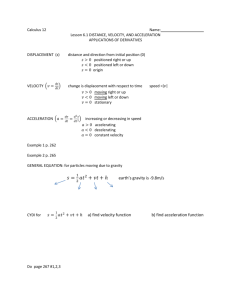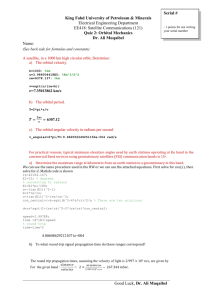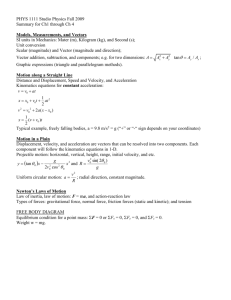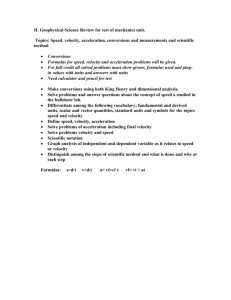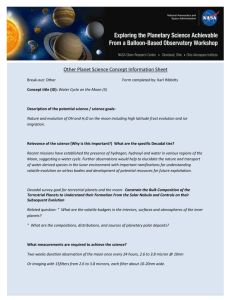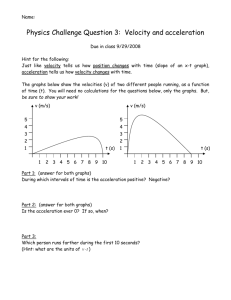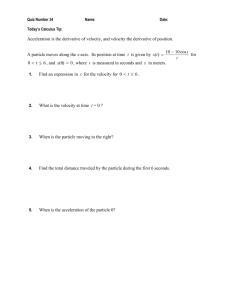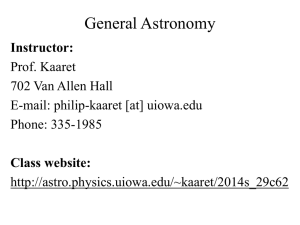Model of tectonical moving of earth lithosphere
advertisement
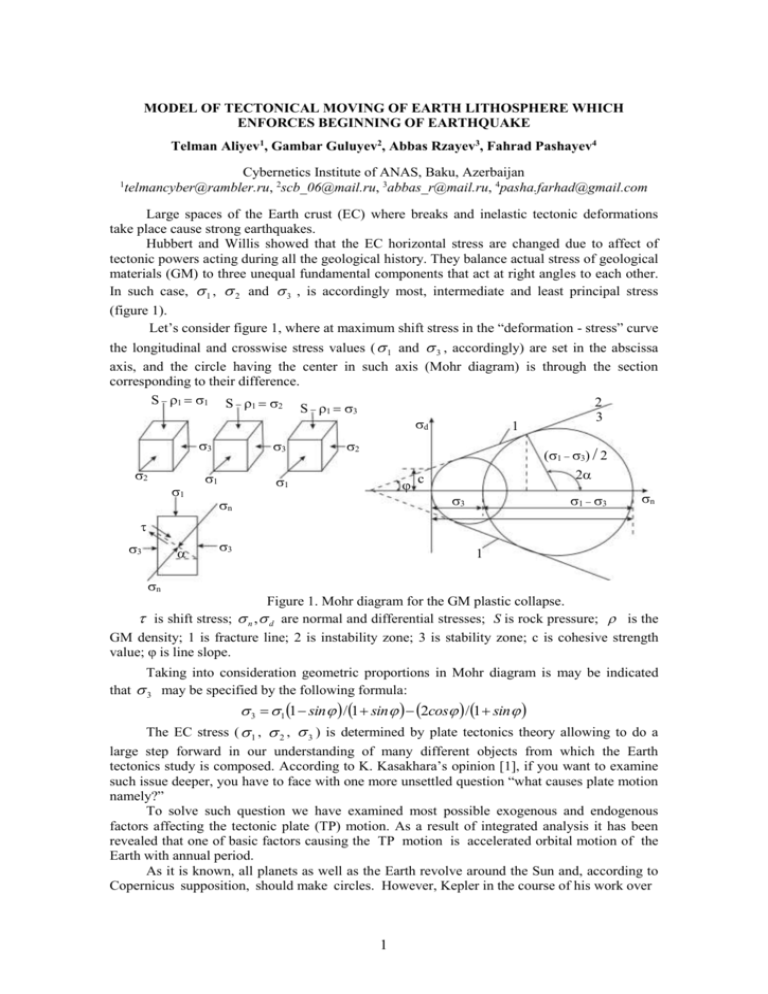
MODEL OF TECTONICAL MOVING OF EARTH LITHOSPHERE WHICH ENFORCES BEGINNING OF EARTHQUAKE Telman Аliyev1, Gambar Guluyev2, Abbas Rzayev3, Fahrad Pashayev4 Cybernetics Institute of ANAS, Baku, Azerbaijan telmancyber@rambler.ru, 2scb_06@mail.ru, 3abbas_r@mail.ru, 4pasha.farhad@gmail.com 1 Large spaces of the Earth crust (EC) where breaks and inelastic tectonic deformations take place cause strong earthquakes. Hubbert and Willis showed that the EC horizontal stress are changed due to affect of tectonic powers acting during all the geological history. They balance actual stress of geological materials (GM) to three unequal fundamental components that act at right angles to each other. In such case, 1 , 2 and 3 , is accordingly most, intermediate and least principal stress (figure 1). Let’s consider figure 1, where at maximum shift stress in the “deformation - stress” curve the longitudinal and crosswise stress values ( 1 and 3 , accordingly) are set in the abscissa axis, and the circle having the center in such axis (Mohr diagram) is through the section corresponding to their difference. S 1 1 S 1 2 2 S 1 3 3 d 1 3 2 1 3 1 2 1 n (1 3) / 2 2 с 3 1 3 n 3 3 1 n Figure 1. Mohr diagram for the GM plastic collapse. is shift stress; n , d are normal and differential stresses; S is rock pressure; is the GM density; 1 is fracture line; 2 is instability zone; 3 is stability zone; c is cohesive strength value; φ is line slope. Taking into consideration geometric proportions in Mohr diagram is may be indicated that 3 may be specified by the following formula: 3 1 1 sin / 1 sin 2cos / 1 sin The EC stress ( 1 , 2 , 3 ) is determined by plate tectonics theory allowing to do a large step forward in our understanding of many different objects from which the Earth tectonics study is composed. According to K. Kasakhara’s opinion [1], if you want to examine such issue deeper, you have to face with one more unsettled question “what causes plate motion namely?” To solve such question we have examined most possible exogenous and endogenous factors affecting the tectonic plate (TP) motion. As a result of integrated analysis it has been revealed that one of basic factors causing the TP motion is accelerated orbital motion of the Earth with annual period. As it is known, all planets as well as the Earth revolve around the Sun and, according to Copernicus supposition, should make circles. However, Kepler in the course of his work over 1 Mars orbit noted that all planets revolving around the Sun make ellipsis, and the Sun is in one focuses of such ellipsis. Therefore, a natural question: “what causes the circular motion deformation (monition along the ellipsis)?” is arisen. Kepler himself didn’t know the deformation reason as he considered insulated solar system where the Sun rested and all planets revolved around it. But in fact, solar system as whole moves around the center of our galaxy at a velocity of 250 km/s [2]. Therefore, in such case, absolute orbital velocity of the planets motion ( vab ) will change not in the line at acceleration of v 2 / r , but also in the value in accordance with our proposed model : (1) vab vs Av sin at acceleration of vab 2 Av sin 900 sin 2700 (2) T T where vs is a the Sun’s longitudinal velocity; Av is change amplitude of orbital velocity of planets; T is planet rotation period. Geometric interpretation of model (1) by the example of Earth is shown in figure 2. according to the figure it is seen that at 00 and 1800 vab vs 250км / сек and in the case of the values of 90 0 and vab 900 vs Av 270 0 accordingly and vab 270 vs Av 0 . The Earth during the other equinox Terrestrial equator plane of the Earth orbit 365 days Winter e 24 hours e t Summer s T The Earth during one of equinox b) a) Figure 2. The Earth’s accelerated motion. а) The Earth’s orbital motion relative to the Sun’s motion; b) The Earth’s absolute velocity change ; t - time; T – annual interval (365.25 days) of the Earth revolution. Our estimates have shown adequacy of the mathematic model (1) at describing motion of planets of the Earth, Mercury and Mars groups (table 1). In the case of the Earth (figure 2) with actual range of orbital velocity changes of 29.3 km/sec in the aphelion to 30.3 km/ sec in the perihelion [3, 4], the adequacy of model (1) is not met. It is related to objective reasons that as compared with Mercury and Mars the Earth is subject to additional acceleration to be specified as follows : vab 1 4 2 A4 sin 900 sin 2700 1 aв Fi F1 F2 F3 F4 (3) T mв i1 T m where mв is the Earth mass ; F1 is tidal power created by the Moon; F2 is the power generated by the Earth’s magnetic field (EMF); F3 is friction force between the ocean bottom and the ocean water; F4 is Coriolis force. Newton showed that rising and low tides are based on inequal water attraction in the ocean from the side of the Moon ( F1 ). The Moon and the Earth together revolve around 2 Table 1 By proposed model Model error calculation (1) By actual data [2, 3, 5] For Mercury Absolute velocity changes : A sin 900 sin 2700 48 2 vab v 0,384 vs 250 At acceleration according to (2) v f vab 2,5263см / сек 2 T v p v vm 1,5 1 0,4 1,25 ms 3,99см / сек 2 2 rmk where 48км / сек is Mercury’s orbital velocity v f v ab v f 0,4 0,38 0,4 100 % 4% 100 % Where v p , va the The Sun-generated acceleration : Model error planet velocity in the perihelion and aphelion v aG a 1,5v p vm v p v 2 For Mars vab 23,12 0,1928 250 v f At acceleration according to (2) vab 0,1633см / сек 2 T vmax vmin vm 26 ,5 22 0,1867 24 ,1 v f v ab v m 0,1928 0,1867 0,1928 100 % 3,16 % 100 % The Sun-generated acceleration : aG ms 0,2578 rm2 common mass center ( rG ), which according to equality rG mв rm mm at the distance of about 4740 km from the center to the Earth (as mm 384400 rm 4740км , where mm is the mв 81 Moon mass, rm the distance from the mass center to the center of the Moon. When the Earth attracts the Moon, the Moon also attracts the Earth with the same and opposite force (Newton’s third law) due to which the force of Mv 2 / rG causing the Earth’s motion around common mass center with one-month period is generated. The Moon moves along its orbit around common center, making a full revolution per month (figure 3). The EMF-generated force ( F2 ) is related to magnetic field located in the Earth’s core and consisting of corpuscles (protons, electrons N and some heavy cores such as calcium, iron and etc.) and generating electric Moon E currents highly in the Earth atmosphere. S At that, charged particles move towards the poles and revolve there along the circle due to influence of Lorentz force: Fl qvBsin (4) E where q and v are charge andvelocity of individual particles; B is magnetic induction module; is theangle between v and B vectors . C Moon Figure 3. Earth and moon rotation around common mass centre. . 3 As a result of interaction of such currents with normal EMF, geomagneticfield is changed and in its turn it induces electric currents. And according to Lentz law, inductive current always has the direction at which its magnetic field counteracts to changes of magnetic flux causing b such current. That is F2 has opposite direction against change vab of the Earth ( vab ). This is one of reasons causing errors in proposed model (1) when the Earth motion is described. As it is known, the Earth revolution around its axis resulted in formation of equatorial relief and caused the Earth shape closer to oblate spheroid rather than to sphere. When the Moon attracts equatorial relief, friction forces are arisen between the ocean bottom and the ocean water: (5) F f S v / l where, is internal friction; S is layer touch area; v is velocity gradient perpendicular to l the S direction it results in deceleration of the Earth motion and the day becomes longer with time. It was a time when day was 5-6 hour only. This factor is also opposite to the Earth absolute acceleration determined by formula (2). When the Earth revolves around its axis and during orbital motion it is affected by Coriolis force ( F4 ): F4 4nv mв (6) where n is number of revolutions making by the system (the Earth) per time unit; v is velocity perpendicular to the revolution axis like velocity gradient ( v / e ) in formula (5). Coriolis force is always opposite to the Earth’ revolution and orbital motion and, therefore, causes change determined by formula (1). According to the mentioned above it may be concluded that the EC (or plate) tectonic motion is closely related to the Earth accelerated motion determined by formulas (1) - (6). As, according to figure 2, the Earth motion accelerates from the autumnal equinox point to the winter point and, therefore, tectonic plates and the Earth core will move backwards (against the motion) under their own inertia, and the Earth motions decelerates from the winter point to the spring equinox and, therefore, inverse process takes place i.e. the plates and core move forwards under their own inertia and thereby cause the EC (or the tectonic plate) and the core vibrational motion with interval of 1 year (figure 2). At that, the core motion model proposed by us is conformed by data indicated in work [4]. In this work it is also noted that there is early undiscovered depth mechanism for formation of annual variations of geophysical processes causing earthquakes. Conclusion As a result of integrated study it was revealed that one of basic factors causing the TP and the Earth core motion is accelerated orbital motion of the Earth with annual interval. Mathematical models adequately describing motion of the Mercury and Mars earth planets are proposed. It is shown that to ensure adequate motion of the Earth, additional forces ( F1...F4 ) sufficiently affecting accelerated motion of the Earth and not available in the planets mentioned above are to be taken into consideration. The results received by us are proved by data of other authors. References 1. Kasakhara К. Earthquake mechanics. Translation from English -М.: Mir, 1985, 264 p. 2. Yenokhovich A.S. Physics and engineering manual. М.: Prosvescheniye, 1989, 224 p. 3. Otto Struve, Beverly Linds, Helen Pillans. Elementary astronomy. М.: Nauka, 1967, 484 p. 4. Malishkov Y.P., Malishkov S.Y. Periodic variations of geophysical fields and seismicity, their possible relation with the Earth core motion. Geology and geophysics, 2009, volume 50, №2, pp. 152-172. 4
